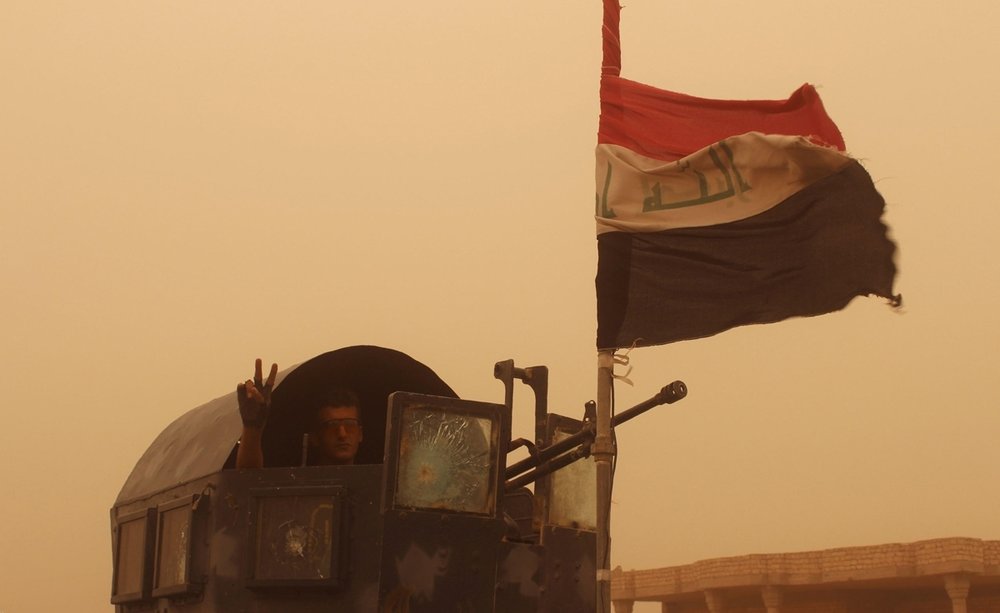Is a new plot against Iraq being hatched?

As Iraqi forces along Popular Mobilization Forces also known as al-Hashd al-Shaabi are engaged in fierce clash with the Islamic State in Iraq and the Levant (ISIL/Daesh) terrorist group and have so far been able to deal major blows to the ruthless terrorist outfit, there seems to be some plots taking place in the war shattered state.
The Iraqi army has retaken the main government compound in the center of Fallujah from the ISIL terrorists and has hoisted the Iraqi national flag above the municipal building on Friday, in a show of force gesture.
The Iraqi government lost control of Fallujah in 2014, months before ISIL took Iraq's second largest city, Mosul, and swept across large parts of the country.
The development follows as the ISIL terrorists did not put much into the fight and surrendered easier than expected. However some reports indicate that there are some pockets of resistance in the city.
The army's advances in to Fallujah, a city with an hour's drive west of the capital Baghdad, mark a significant step in the nearly four-week-old offensive to retake the ISIL terrorist group’s bastion.
Both, the operation's overall commander, Lieutenant-General Abdulwahab al-Saadi and Iraq's federal Police Chief Raed Shaker Jawdat say the liberation of the government compound, which is the main landmark in the city, symbolizes the restoration of the state's authority in Fallujah.
In the meantime, a senior Iraqi Kurdish official says Iraq should be divided into three separate entities once ISIL terrorists are defeated, alleging it was necessary to prevent further sectarian bloodshed.
Masrour Barzani, the head of the Iraqi Kurdistan's Security Council and the son of regional head Massoud Barzani, said on Thursday that Iraq should be divided based on ethnic and sectarian lines, with a state given to Shia Muslims, Sunnis and Kurds each.
There was no sectarian bloodshed in Iraq at least in recent past and as the world is watching all Iraqis no matter of what ethnicity, religion or creed have joined and shook hands and are trying to help the main government to tackle the ISIL threat.
I can refer to the Sunni Arab tribe of al-Bu Nimr, a tribe of some 10,000 people living in the area of Ramadi in Anbar Province of Iraq. In the years after 2007 Albu Nimr was part of the Sahwa militia that fought al-Qaeda in Iraq. In 2014 it was one of the Sunni Arab tribes that fiercely opposed the ISIL. ISIL had declared that Sunni Muslims who fight against their Caliphate are to be executed.
At the end of October 2014 there were reports that ISIL terrorists massacred Albu Nimr tribesmen. The bodies of some 200 of them were found in a ditch used as a mass grave near Hit, while over 60 tribesmen were publicly executed inside the city.
Lets not forget that they were a minority religious group in a mainly shia state.
This is while we cannot forget the braveries of the Kurdish men and women fighters known as Peshmerga forces in liberating the border city of Kobani (Ayan al-Arab) from the ISIL grip.
And of course one cannot forget the help of Popular Mobilization Forces also known as al-Hashd al-Shaabi in the fight against the ISIL terrorists.
With all these facts Barzani said “Federation hasn’t worked, so it has to be either confederation or full separation, if we have three confederated states, we will have equal three capitals, so one is not above the other.”
Barzani has made similar calls in the past, which have been met with strong opposition by the central government in Baghdad as well as all different Iraqi tribes.
Over the past few years, Iraq’s Kurdish region has attempted to increase its semi-autonomy by constructing an independent oil pipeline to Turkey and conducting oil exports without coordination with Baghdad.
